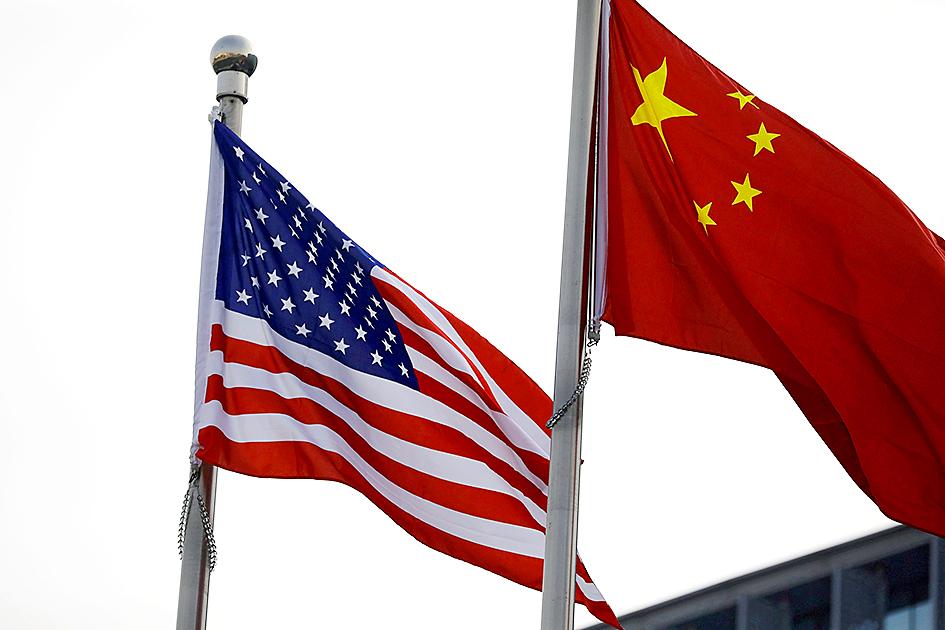By cutting some of its few communication links with the US military, China is raising the risk of an accidental escalation of tension over Taiwan at a critical moment, security analysts, diplomats and US officials said.
China called off planned formal talks involving theater-level commands, defense policy co-ordination and military maritime consultations on Friday as part of its retaliation against US House of Representatives Speaker Nancy Pelosi’s visit to Taiwan this week.
In an editorial yesterday, the Chinese Communist Party’s People’s Daily described the response, along with sanctions against Pelosi and her family, as “effective measures that fully demonstrate that China is fully determined and capable of safeguarding national unity and safeguarding ... sovereignty and territorial integrity.”

Photo: Reuters
US Naval Postgraduate School security expert Christopher Twomey said that the severing of the communication links is worrying, coming at what he believes is the beginning of a new Taiwan crisis.
China fired ballistic missiles over Taipei as part of four days of unprecedented military drills due to end at noon on Sunday.
“This increased density of forces, in the context of an intensifying crisis, raises the prospect for inadvertent escalation that neither side wants,” Twomey said, speaking in a private capacity.
“That is precisely the time you would want to have more opportunities to talk to the other side ... Losing those channels greatly reduces the ability of the two sides to de-conflict military forces as various exercises and operations continue,” he said.
As Chinese warships, fighter jets and drones maneuver around Taiwan, at least four powerful US vessels, including the aircraft carrier USS Ronald Reagan, the amphibious assault ship USS Tripoli and the guided missile cruiser USS Antietam are east of Taiwan, Reuters has confirmed.
Prospects are “extremely low for holding talks on risk reduction measures or stability,” said Bonnie Glaser, director of the Asia program at the German Marshall Fund of the United States.
Glaser said that she expects that the specific talks called off this week would resume over time, but “right now, China has to signal toughness and resolve.”
A US official, speaking on condition of anonymity, said Chinese officials had not responded to calls from senior Pentagon officials this week, but that was seen as China showing displeasure over Pelosi’s trip rather than the severing of the channel between senior defense officials, including US Secretary of Defense Lloyd Austin.
Austin pushed for improved communication between the rival forces when met Chinese Defense Minister General Wei Fenghe (魏鳳和) on the sidelines of the Shangri-la Dialogue security meeting in Singapore in June.
Asian and Western diplomats said that US military chiefs had been pushing for more frequent theater-level command talks for some time, given China’s growing deployments across Asia, where the US navy has traditionally been the dominant power.
The Pentagon said on Friday that China was overreacting, and the US was still open to building crisis communication mechanisms.
“Part of this overreaction has been strictly limiting its defense engagements when any responsible state would recognize that we need them now the most,” Pentagon acting spokesman Todd Breasseale said.

The Central Weather Administration (CWA) today issued a sea warning for Typhoon Fung-wong effective from 5:30pm, while local governments canceled school and work for tomorrow. A land warning is expected to be issued tomorrow morning before it is expected to make landfall on Wednesday, the agency said. Taoyuan, and well as Yilan, Hualien and Penghu counties canceled work and school for tomorrow, as well as mountainous district of Taipei and New Taipei City. For updated information on closures, please visit the Directorate-General of Personnel Administration Web site. As of 5pm today, Fung-wong was about 490km south-southwest of Oluanpi (鵝鑾鼻), Taiwan's southernmost point.

UNILATERAL MOVES: Officials have raised concerns that Beijing could try to exert economic control over Kinmen in a key development plan next year The Civil Aviation Administration (CAA) yesterday said that China has so far failed to provide any information about a new airport expected to open next year that is less than 10km from a Taiwanese airport, raising flight safety concerns. Xiamen Xiangan International Airport is only about 3km at its closest point from the islands in Kinmen County — the scene of on-off fighting during the Cold War — and construction work can be seen and heard clearly from the Taiwan side. In a written statement sent to Reuters, the CAA said that airports close to each other need detailed advanced

Tropical Storm Fung-Wong would likely strengthen into a typhoon later today as it continues moving westward across the Pacific before heading in Taiwan’s direction next week, the Central Weather Administration (CWA) said. As of 8am, Fung-Wong was about 2,190km east-southeast of Cape Oluanpi (鵝鑾鼻), Taiwan’s southernmost point, moving westward at 25kph and possibly accelerating to 31kph, CWA data showed. The tropical storm is currently over waters east of the Philippines and still far from Taiwan, CWA forecaster Tseng Chao-cheng (曾昭誠) said, adding that it could likely strengthen into a typhoon later in the day. It is forecast to reach the South China Sea

Almost a quarter of volunteer soldiers who signed up from 2021 to last year have sought early discharge, the Legislative Yuan’s Budget Center said in a report. The report said that 12,884 of 52,674 people who volunteered in the period had sought an early exit from the military, returning NT$895.96 million (US$28.86 million) to the government. In 2021, there was a 105.34 percent rise in the volunteer recruitment rate, but the number has steadily declined since then, missing recruitment targets, the Chinese-language United Daily News said, citing the report. In 2021, only 521 volunteers dropped out of the military, the report said, citing